DUP looking for new leader as Edwin Poots quits
The Democratic Unionist Party is to begin the process of finding a new leader following Edwin Poots' resignation after 21 days as leader.
He resigned on Thursday night after an internal party revolt over his decision to agree a deal with Sinn Féin and nominate Paul Givan as first minister.
A majority of DUP members in the assembly wanted to delay the process.
It is believed that Sir Jeffrey Donaldson is the favourite to succeed Mr Poots.
The Lagan Valley MP ran against Mr Poots for the leadership and was narrowly defeated in the wake of Arlene Foster's ousting.
Mr Poots, who took over as leader in May amid internal tensions about the direction of his leadership and the manner of Mrs Foster's departure, announced his resignation after a meeting of DUP party officers on Thursday night.
The BBC understands a motion of no confidence was mentioned at the meeting, but not tabled.
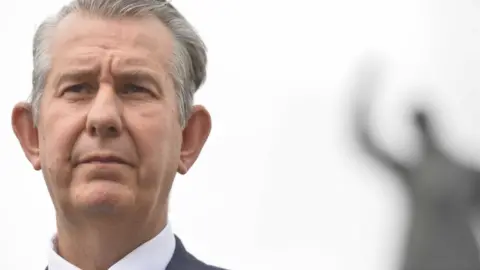 Press Association
Press AssociationParty sources described the meeting as "robust" and said it had become clear Mr Poots knew he had to resign.
The process to appoint his successor could move "at pace", according to one DUP figure.
There are concerns that the instability around Mr Poots' exit could threaten the future of power-sharing at Stormont.


Focus now turns to who succeeds Edwin Poots, and Sir Jeffrey Donaldson will be the popular choice within the party.
He will be seen as the man who will possibly be able to heal some of the wounds that have been played out in public. That's not to say that there will not be many who may feel uncomfortable with that, as not everyone voted for him in the recent leadership election.
There is a sense, though, that Sir Jeffrey will be coronated - it is unlikely that there will be a leadership contest.
The party will want to move pretty quickly now, as it will not want to look back at the sores that were created during Edwin Poots' short reign as leader.
I think that whoever will take over as leader - most likely Sir Jeffrey - will not want any more political instability.
So Paul Givan will probably remain as first minister for now.

On Thursday night, Mr Poots said he had asked the party chairman to start the process to elect a new leader, and that he would would remain in post until his successor is elected.
"This has been a difficult period for the party and the country and I have conveyed to the chairman my determination to do everything I can to ensure both unionism and Northern Ireland is able to move forward to a stronger place," he said.
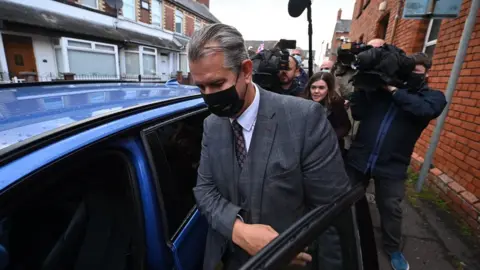
A planned North-South Ministerial Council (NSMC) meeting in Armagh will now not be going ahead on Friday, the Irish government has said.
The NSMC is the main body for cross-border co-operation between the governments of Northern Ireland and the Republic of Ireland.
What has the DUP said?
DUP MLA Jim Wells, a supporter of Mr Poots during the DUP leadership election, described his resignation as sad and "very unfortunate".
"The DUP did not have a leadership election for 50 years and now we are going to have two in 50 days," he told the BBC's Good Morning Ulster programme.
He said there were huge issues ahead and the new leader had to have to support of all in the party.
On Friday, DUP Armagh City, Banbridge and Craigavon councillor Darren Causby resigned from the party.
Though he supported Edwin Poots as leader, he disagreed with his decision to nominate Paul Givan as first minister in defiance of MLAs and MPs.
He also does not believe the party will change course under Sir Jeffrey Donaldson.
"The DUP is not the party I joined and I have been unhappy for some time," he said.
"We can't allow Sinn Féin to dictate what happens and that has been the case for some time."
What has the wider political reaction been?
Deputy First Minister Michelle O'Neill described Thursday as a "tumultuous" day.
"Clearly the DUP is at a crossroads, and they have a choice to make," Ms O'Neill said.
"The choice is to work with the rest of us, to deliver on power-sharing, to deliver rights, or continue to resist those very rights."
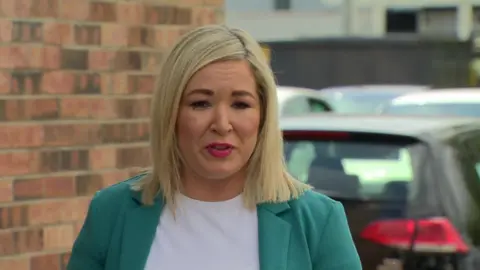
She added that she had not spoken to Mr Givan since Mr Poots resigned.
Ulster Unionist Party (UUP) leader Doug Beattie said there is a crisis within the DUP "and the brand of unionism that follows them".
"They left the goal open for Sinn Féin to score. That's why the DUP finds itself in a degree of crisis, whether it's imploding or just a blip, we'll see that in the coming weeks and months," Mr Beattie said.
SDLP leader Colum Eastwood said unionism needed to "figure out how it wants to engage with the rest of us".
"The last few weeks have been a joke. It has been a real mess for unionism and a mess for all of us," he said.
"The only way that we can make this place work is to work it together."
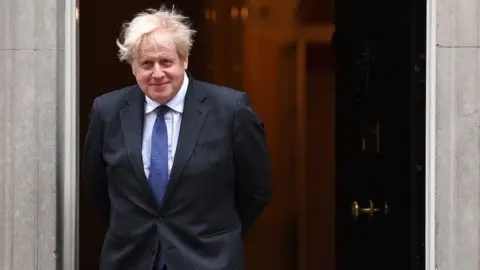 EPA
EPAAlliance Party MLA Kellie Armstrong said the "big disaster" would happen if the new first minister - the DUP's Paul Givan - also resigned.
"We have so much to be getting on with. There are ordinary people all over Northern Ireland who still need us to lead. Playing games with politics is just a nonsense," said Ms Armstrong.
Traditional Unionist Voice (TUV) leader Jim Allister said he was "astounded" by the speed with which Mr Poots' leadership came to an end, even though he did not expect it to last.
He said Mr Poots had left unionism "in a weaker position than how he found it".
He said the challenge for unionism was to focus on the main issue, which he said was "dismantling the protocol and its defeat".
The protocol is the part of the Brexit deal that places border in the Irish Sea.
There have been growing tensions within unionism and loyalism about the Northern Ireland Protocol, the part of the Brexit deal that created an Irish Sea border.
Unionists oppose it as they believe it damages the integrity of the UK, and Mr Poots had pledged to get it scrapped as part of his leadership campaign.
Prime Minister Boris Johnson said it is good that the executive is "back up and running".
"What we want to do as the UK is ensure we look after the stability of Northern Ireland, the peace process and of course the union," he said.
Taoiseach (Irish prime minister) Micheál Martin said he intends to work collectively with all parties to ensure stability at Stormont.
"It will now be a matter for the Democratic Unionist Party to elect a new leader and once that happens we need steady engagement," Mr Martin said.
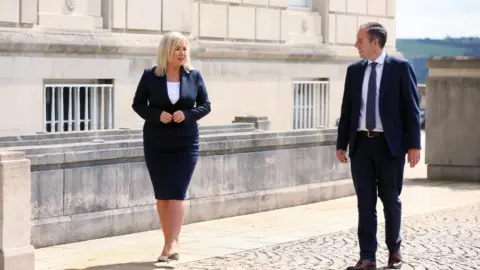 PAcemaker
PAcemakerHow did we get here?
This latest issue was sparked after a late-night deal was done between Sinn Féin, the DUP and Secretary of State Brandon Lewis ending a stalemate over Irish language laws to allow for the nomination of a new first minister.
The position had become vacant after Mrs Foster formally resigned on Monday, thereby also triggering the resignation of Sinn Féin Deputy First Minister Michelle O'Neill, as it is a joint office.
Mr Poots had named Mr Givan as the DUP's pick to replace Mrs Foster, while Sinn Féin said Ms O'Neill would resume her post as deputy first minister.
But Sinn Féin had wanted commitments from the DUP over a timetable for implementing Irish language legislation, as set out in the New Decade, New Approach deal that restored power sharing in January 2020.
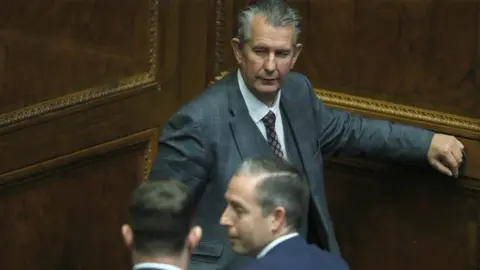 Brian Lawless
Brian LawlessThe party said this was not forthcoming, and it called on Mr Lewis to bring in Irish language legislation via Westminster.
Mr Poots had said he was committed to implementing all of the NDNA commitments, including those around Irish language, but not necessarily before the end of the current assembly mandate in May 2022.
A deal was then struck between the two parties and the secretary of state in the early hours of Thursday morning that would see Westminster legislate for Irish language commitments in October, if Stormont fails to do so beforehand.
DUP MPs and peers wrote to Mr Poots expressing concern about the deal, ahead of a DUP assembly group meeting which it is understood saw the vast majority of DUP MLAs - 24 to four - oppose Mr Poots nominating Mr Givan as first minister as a result of the deal.
However, Mr Poots and Mr Givan left the meeting early, ahead of a special sitting of the assembly which then confirmed Mr Givan and Ms O'Neill as first and deputy first ministers.
The Loyalist Communities Council (LCC) said the new DUP leader must "stop the constant flow of concessions to Sinn Féin" even if it meant suspending the normal operation of devolution.
They urged Westminster to "retract their ill-thought out and rushed decision to legislate for Irish language at Westminster or risk prompting significant political and community instability".
